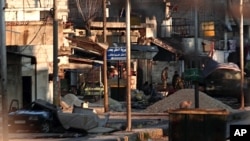The Syrian National Council says its decision to form a military council and unify the opposition will help get weapons from outside sources. The U.S. says all options on the table in Syria, but has not commented on whether to arm the opposition.
With rebels having retreated and Syrian army forces having moved into the opposition stronghold of Baba Amr, there are calls in the international community for limited military intervention against President Bashar al-Assad's government.
Danielle Pletka, an analyst with the conservative American Enterprise Institute, agrees. “Something that would not get us heavily involved, yes. But I think that we ought to look first at the option of arming the Free Syrian army as our first line of offense against Assad,” she said.
The Obama administration has said it will consider “every tool available” to stop the slaughter, but has made no comments on possibly supplying arms.
Phyllis Bennis, an analyst with the progressive Institute For Policy Studies says any militarization is a bad idea.
“That regime is strongest in the military arena. Weakest in the arena of international legitimacy, human rights, the support of the population. So, as soon as you make it entirely a military battle, you are playing to the strengths of the regime,” said the analyst.
Some experts argue the opposition is too fragmented and not under a central command, making it difficult to know to whom the weapons would go. Analyst Pletka says these concerns give pause, but are not crucial if the goal is to remove the Assad regime.
“Do we want to try and unify them politically, and help them militarily through the provision of weaponry, potentially not necessarily by the United States, but by our Gulf allies for example? I think the answer to that is yes,” she said.
There are also concerns that arming opposition groups could fuel sectarian tensions and lead to a deeper civil war.
“Then you are left with a lot of unaccountable militias," said analyst Bennis. Very similar to the situation now facing people in Libya where you have powerful militias that are holding prisoners, being alleged to be committing terrible human rights violations, and no accountability to anyone.”
There have also been reports of organizations on the U.S. terrorist list such as al-Qaida and Hamas lending support to the opposition. Pletka argues the longer the U.S. waits, the more likely these groups will sway influence in Syria.
“The answer is to find people you want to work with, do your best to unify them, do your best to give them a political cause, a government in exile and leadership they can answer to, and then work with them to oust Assad,” she said.
Until now, Saudi Arabia is believed to be the main supplier of weapons to the opposition. But Syria watchers believe more are on the way.
On Friday, the Turkish foreign minister met with the Syrian opposition with the discussion of arms supplies on the table.
| Join the conversation on our social journalism site - Middle East Voices. Follow our Middle East reports on Twitter and discuss them on our Facebook page. |













